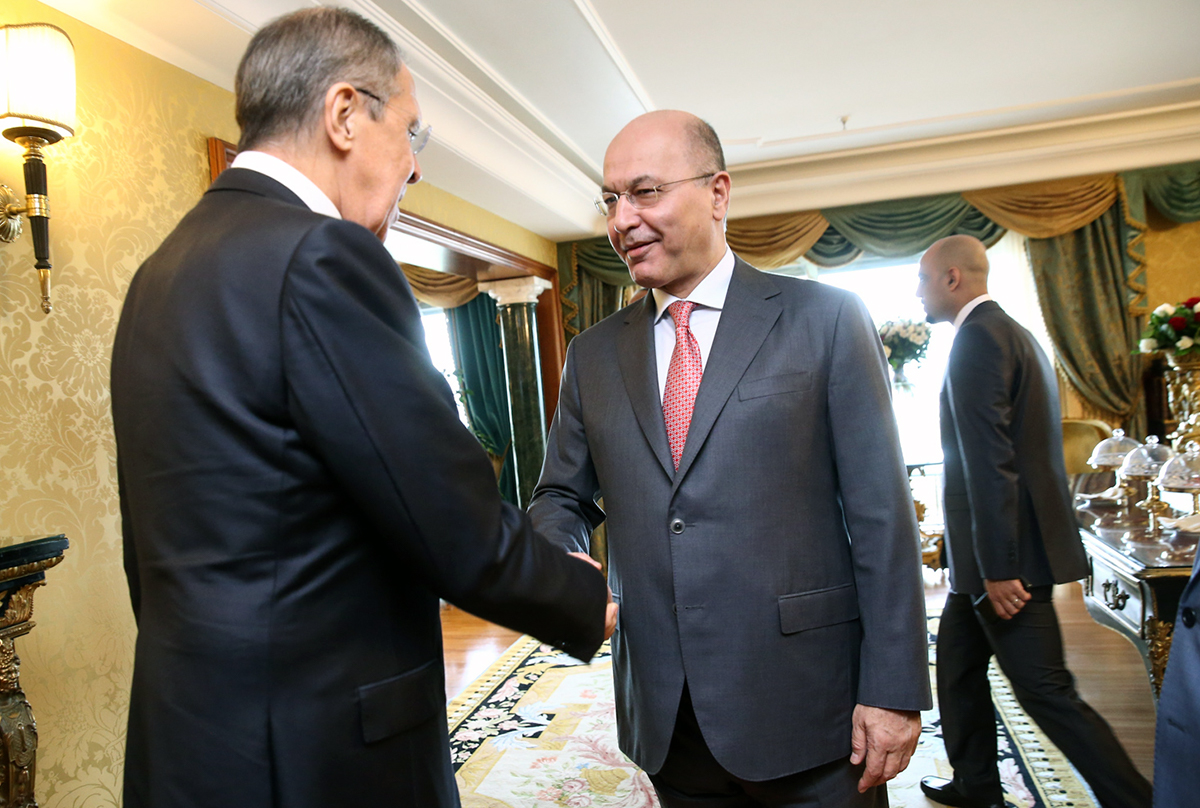
Iraq: From a failed state to the epicenter of change
Analysis. Recent developments in Iraq can infuse optimism for the future of the land of the earliest civilization of human history. President Barham Salih and Prime Minister Adil Abdulmehdi have a good chance of steering Iraq out of crisis and potentially make it the epicenter of change in the Middle East, writes Cengiz Çandar, Senior Associate Fellow at the UI.
Publicerad: 2018-12-05
“Iraq is an important strategic hub that joins the Arab world with Iran and Turkey, and I will say to Europe too, and connects the economies of the Gulf and Europe. These projects could connect the countries of the region, and Iraq could hopefully become the heart of a new Silk Road to the Mediterranean. In order for this plan to happen, however, neighboring countries must help and Iraq should not be burdened with further tensions and escalations in our neighborhood. For millennia Iraq has been the catalyst, the precursor for regional order or disorder. I daresay that there is now an opportunity to reorient Iraq’s trajectory and propel the country towards prosperity.”
These were words of Iraq’s new President Barham Salih in a keynote speech at the Mediterranean Dialogues in Rome, the annual forum, hosted by Italy’s Ministry of Foreign Affairs and the Italian Institute for International Political Studies (ISPI). While in Rome, he also visited the Vatican, met with Pope Francis and wrote on Twitter: “Honored to have met His Holiness the Pope, he cares deeply for Iraq and prays for our success. I invited him to visit Ur, where Abraham started his mission of peace and unity. Iraq can bring together believers, from all faiths to affirm values of peace, tolerance & confront extremism.”
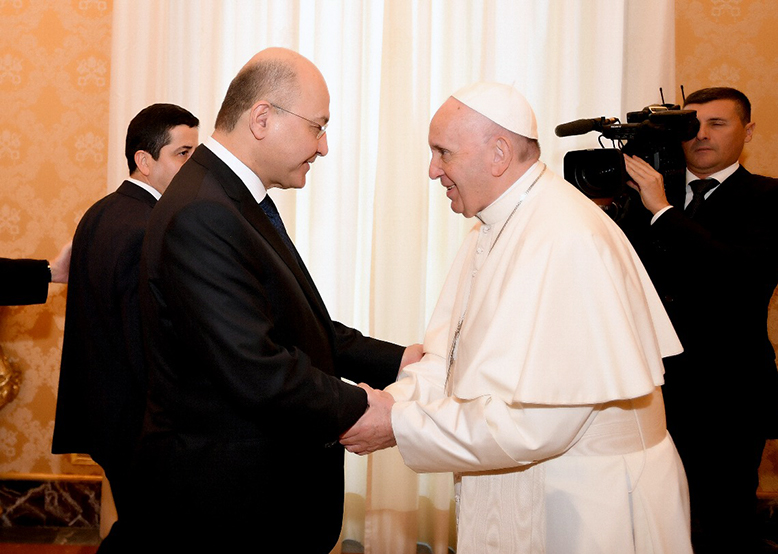 President Barham Salih with Pope Francis.
President Barham Salih with Pope Francis.
Barham Salih traveled to Rome after finishing a regional tour that saw him visiting Kuwait, the United Arab Emirates, Jordan, Iran, and Saudi Arabia, bringing a message that Iraq wants to work with its neighbors but will not tolerate interference. It was high-profile diplomacy by an Iraqi official in the region, previously unseen in the wake of the regime change in 2003.
All this, unmistakably, could be regarded as most unusual coming from an Iraqi personality during this historical epoch. Anything related with Iraq is pertinent to extremism, intolerance, sectarian fighting reminiscent of the Thirty Years’ War of Europe that drowned thousands of people in a bloodbath, disintegration rather than unity, war rather than peace. In this regard, Barham Salih presented an awareness of Iraq’s unique geopolitics and exceptional historical depth, somehow different than his predecessors in post-Saddam Iraq, including his mentor, the late Jalal Talabani.
Epicenter of change?
Barham Salih’s name may be listed in a chronology of the rulers in the land of Mesopotamia that includes Sargon of Akkad, Hammurabi and Nebuchadnezzar of Babylon, Ashurpanipal of Assyria, Harun Al-Rashid, King Faisal, Saddam Hussein, Jalal Talabani, etc. The new president is also aware of the Herculean tasks ahead in today’s Iraq, no matter what titles those in charge may be holding. Restoring basic services, reconstructing war-devastated cities and towns, helping more than 1.8 million displaced citizens return home and, perhaps the most daunting of all, drying up the swamp of corruption.
”These are no easy objectives to be obtained in a country that has gone through war, conflict, sanctions, and repression for decades. In the last years Iraq suffered bloodshed, genocide, instability, moving from one war to another. Our community is devastated. It is time to achieve economic regeneration. We have to pursue this agenda. We are the epicenter of change in the Middle East,” he said in Rome, in his keynote.
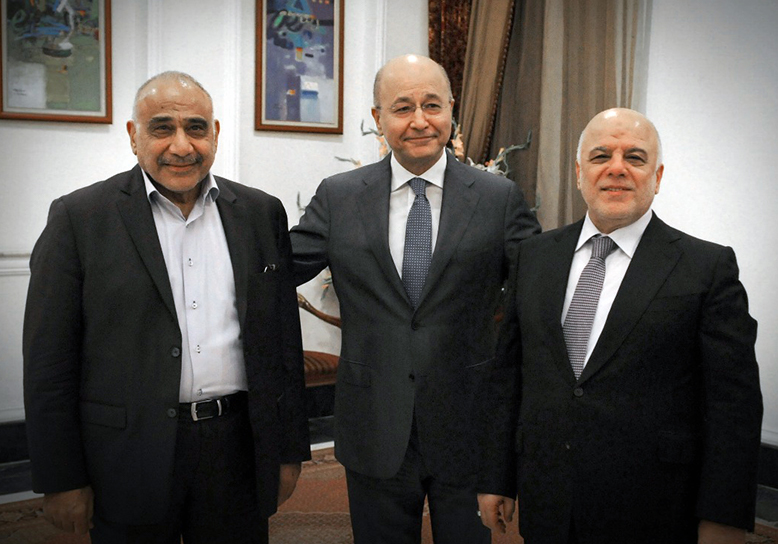 New Iraqi Prime Minister Adil Abdulmehdi, president Barham Salih and outgoing PM Haidar al-Abadi.
New Iraqi Prime Minister Adil Abdulmehdi, president Barham Salih and outgoing PM Haidar al-Abadi.
The new Iraqi government led by Adil Abdulmehdi has an ambitious agenda, Barham Salih confidently explained, which includes the launching of a reconstruction agency to attract Iraqi and international investments in infrastructure projects like deep port facilities in Basra, railway networks, highway networks, airports, industrial cities, dams, and irrigation projects in the Nineveh plains and the Kurdistan region. That is a recipe to bring employment to Iraq’s large youth population and boost the economy of the Middle East. It is important to note that half of the population is below the age of 21. The population is expected to increase to 50 million by 2050. Iraq’s Central Statistical Organization announced on October 1 that the country’s population reached about 38 million in 2018, and Baghdad’s more than 8 million. Iraq’s high rate of population growth, at 2.6 percent, places tremendous pressure on development and economic resources.
The Iraqi president was right in saying “No other country has suffered what Iraq has suffered. Think about it – four decades of a sustained cycle of instability.” Perhaps, only Syria; its neighbor to the west to which it is linked with history, culture, ethnicity, topography, and destiny; could challenge the plight and devastation the people of Iraq witnessed over the last decades.
Iraq’s ills were exacerbated by the American-led coalition’s war in 2003. The June, 2014 takeover of the second largest city, Mosul, by the Islamic State (ISIS) furthered revealed the bankruptcy of post-2003 political order. The absence of rule of law, dysfunctional governance, corruption, violent sectarian divisions (Shia versus Sunni), deepening ethnic cleavages (Arab versus Kurd), intra-sectarian and ethnic conflicts (Shia versus Shia, Sunni versus Sunni, Kurd versus Kurd) and fragmentation of the political space, all indicated the destination of an irreparably failed state.
Sectarian power-sharing of Iraq akin to Lebanon that intensified the identity politics, sowed the seeds of mistrust among its communities and caused the institutional dysfunction provided the post-2003 political elites the alibi for poor governance, lack of services, and rampant corruption.
Balancing act and two best actors
Iraq was brought to the brink of collapse too many times during the last two decades. Almost miraculously, the Iraqi state has not collapsed but has proved its resilience. Even the Iraqi identity has asserted itself, despite the characterization of King Faisal I who in 1932 said with bitterness: “There is no Iraqi people inside Iraq.” Iraq is a land of paradoxes, Faisal, the monarch the British installed on the throne in Baghdad by bringing together three diverse Ottoman provinces of Basra, Baghdad, and Mosul, and patching up a country named Iraq, was not Iraqi himself. However, just when there was fear the country would break up and cease to exist, the prime minister installed by majority sect Shia consensus, Adil Abdulmehdi, is pure and deep Iraqi.
Barham Salih, a Kurd with his unconcealed orientation toward Baghdad, and the true Iraqi Adil Abdulmehdi could be the best choices in the year 2018 for the posts of the presidency and the prime ministry, to enable the phoenix Iraq to rise from the rubble of two decades with a vision for the future.
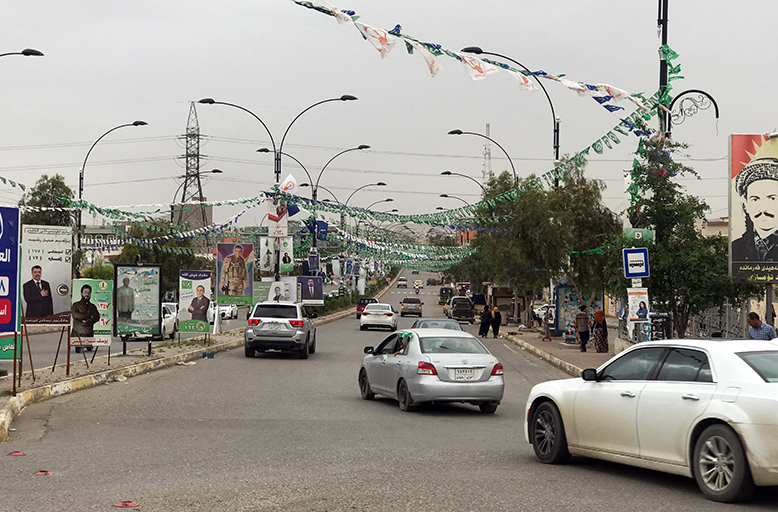 Kirkuk on Election Day on 12 May 2018. Photo: Sarbast T. Hameed/Creative Commons
Kirkuk on Election Day on 12 May 2018. Photo: Sarbast T. Hameed/Creative Commons
A common trait which is most essential to Iraq is that they are perhaps the best names that could play the balancing act between the United States and Iran. Iraq’s survival rests upon that balance to a certain degree. Barham Salih is a true Washington insider with almost ten years of residence in the American capital, which he still feels is a home where he fostered good relations with the elite at the bipartisan level. On the other hand, he would not have been elevated to the post of the Iraqi presidency if Iran, that he managed to forge very good relations with in the last two years, had not use its leverage on the Patriotic Union of Kurdistan (PUK) to nominate him. Barham Salih broke with PUK a year ago and established his own Coalition for Democracy and Justice in fierce opposition against the PUK and the Kurdistan Regional Government’s senior partner, the Kurdistan Democrat Party (KDP). His new party fared poorly in the elections in May 2018, sending only two deputies to the Iraqi parliament. Had it not been for Iranian closed-door machinations, he would never have acquired the post he had coveted for so long.
Salih and Abdulmehdi emerged and represented a kind of compromise between Tehran and Washington. That is what Iraq needed at this political juncture.
The Kingmakers
The leading Shiite cleric, 88-year-old Grand Ayatollah Ali al-Sistani of Najaf, became a decisive voice for the most critical executive post, that of the prime minister, when he released a statement urging “new faces” in the next government, thereby ruling al-Maliki and al-Abadi out and setting the stage for Abdulmehdi.
The other de facto “kingmaker” was the young maverick cleric Muqtada al-Sadr, the leader of the Shiite resistance against the U.S. forces in Iraq in 2004 and 2005, who had emerged as a fierce critic of Iranian influence in Iraq. His Sairoon bloc, without whose support the formation of any government would be impossible, consisted of the Iraqi Communist Party and largely secularist and pro-civil society groups, blunt in criticizing the corruption that had become endemic into Baghdad politics. It won 54 seats more than any other coalition, followed by Hadi al-Amiri’s Fath (48), and Haidar al-Abadi’s Nasr (42). Nouri al-Maliki’s State of Law coalition dropped to 25 from 92 that it had won in 2014 elections.
After the elections in May, Muqtada al-Sadr formed a new coalition, al-Islah (Reform) and al-Imar (Reconstruction), and came to an agreement with Hadi al-Ameri on nominating Adil Abdulmehdi as the prime minister. The deal came after the unrest in Basra in which Muqtada’s followers played a significant role, and the burning of the Iranian consulate. The political parties felt the urgency and the gravity of the situation that posed a danger to them collectively.
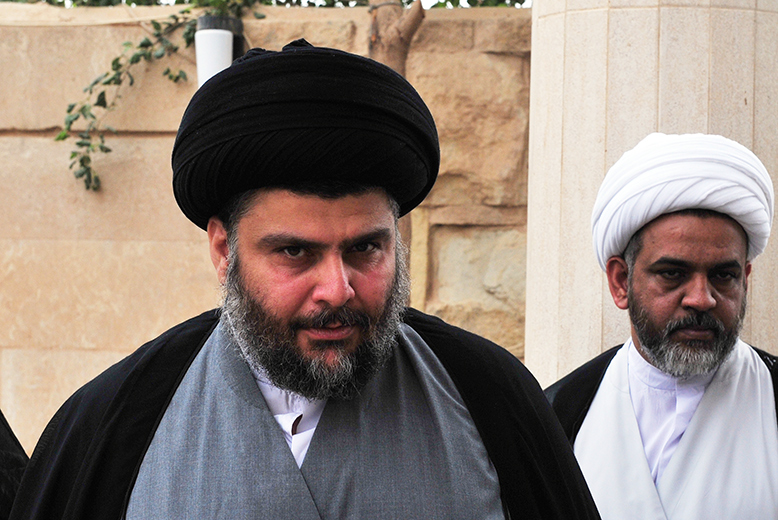 Muqtada al-Sadr. Photo: Shutterstock
Muqtada al-Sadr. Photo: Shutterstock
A new chapter
The Muqtada al-Sadr/Hadi al-Ameri deal and Abdulmehdi’s designation as prime minister ended the 13-year brazen Shiite sectarian rule of the Islamic Dawa Party and opened a new chapter for Iraq.
Adil Abdulmehdi, beyond any doubt, is the most colorful political figure in Iraq, if not in the broader region of the Middle East. For six decades, 76-year-old Abdulmehdi, with an impeccable command of French and English, has been through every episode of Iraq’s recent history. He passed through the torture chambers and prison cells, lived in exile in Beirut and France, and travelled to almost every ideological destination from Baathism to Marxism, to Islamism, finally reaching a stage where can be called an independent.
KRG President and KDP Chairman Masoud Barzani visited Baghdad on the day Barham Salih was in Rome and praised Abdulmehdi lavishly, calling the president “a brother and a friend who has his full trust.” A year ago, Barzani was committed to unplug Kurdistan from Baghdad. But the Hashd al-Shaabi (People’s Mobilization) Units commanded by Hadi al-Ameri overran Kirkuk and all the disputed territories between Baghdad and Erbil, putting an end the independence aspirations of the Kurdish national leader. However, it was Hadi al-Ameri, a year later, who greeted Masoud Barzani with a red-carpet welcome at Baghdad airport, indicating the endless margins for flexibility in the Iraqi and the Middle Eastern political equation.
Adil Abdulmehdi’s past shows that he is ideologically flexible, very experienced and well-positioned to play the balancing act between Tehran and Washington, and among the different regional power centers and Iraqi groups.
Reading the recent developments of Iraq through the lenses of performing arts, with players like Muqtada al-Sadr and Barham Salih, Adil Abdulmehdi on the stage, can infuse optimism for the future of the land of the earliest civilization of human history. If, like T.S. Eliot, one tends to believe that “vast impersonal forces” rather than individuals are the decisive factor in history, it is necessary to discover those “impersonal forces” to explain how an ostensibly failed state named Iraq has begun to navigate to become the epicenter of change in the Middle East.
Such “forces” appear to have been in play, since Iraq is offering a hopeful picture to the international system.
Iraq as a failed state is not a foregone conclusion anymore. Its resilience and the flexibility and the talent for compromise of its political players proved otherwise, despite the continuing row in forming the government. Whether it will become the epicenter of change in the Middle East remains to be seen. Nonetheless, the hope is there.